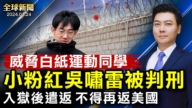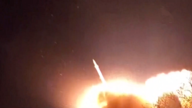【新唐人2014年04月10日訊】美、中兩國防長週二在北京會面,在當天的記者會上,兩人就東海、南海爭端、網路間諜等議題「火拼」。美國防部長哈格爾指責中共,「無權單方面」在有爭議領土上空劃設「防空識別區」。而中共國防部長常萬全則回應,為了捍衛領土主權,必要時北京也會做好「武力準備」。
美國防部長哈格爾在4月8號北京舉行的聯合記者會上,針對中共去年劃設的「東海防空識別區」,再次表明美方的立場。
哈格爾說:「美國在這個議題上已經說得非常清楚,那就是:首先,每個國家都有權劃設防空識別區,但無權在沒有與其他國家合作和諮詢的情況下,單方面作出這樣的決定,這樣做升高緊張、誤會,最終可能導致危險的衝突。」
中共國防部長常萬全回應說,中共隨時準備應對任何區域間的威脅,但也願意和相關國家通過談判來解決爭端。
他還警告說,對日本的行為,美方應「保持警惕」,不得姑息和慫恿。
中共去年10月劃設的「東海防空識別區」,涵蓋了與日本有爭端的的釣魚島。美方多次表明不承認中共的做法。
紐約城市大學政治學教授夏明:「現在東海地區,尤其涉及到釣魚島爭議,屬於非常緊張的狀態,中共這樣做的話,其實是有意在升級推高衝突,那麼美國和日本面對這種挑戰,必須要做出回應,根本就不會認可。」
哈格爾在抵達中國之前,訪問了日本,他向媒體表示,中共必須對它的軍事擴張更為透明,在領土爭端的問題上尊重鄰國。
美國中文雜誌《中國事務》總編輯伍凡指出,自2011年底,釣魚島被日本收購後,中、日關係就很緊張。去年日本首相安倍晉三上臺後,又主張釣魚島主權屬於日本,不和中共談釣魚島主權問題,所以問題一直擱置到現在。
美國中文雜誌《中國事務》總編輯伍凡:「中共設立防空識別區的一個具體的目標,就是針對釣魚島,它防空識別區把釣魚島涵蓋裡頭,也把日本對中國所設定的防空識別區重疊,立刻引起了美國、日本強烈的反對。」
伍凡分析,雖然中共設立防空識別區是針對釣魚島,但並不是為了解決釣魚島問題。
伍凡:「它還有一個目地是對內的,它要利用國內的民族主義的思潮,向外擴張,如果任何一架飛機進入了中共設定的防空識別區,不聽指揮、不聽監督,要把它打下來,由此,中共希望獲得民心、鞏固政權,以滿足軍方紅二代向外擴張的要求。」
伍凡分析,中共想用「愛國棋子」轉移國內的社會危機,卻遭到中國網民們的冷嘲熱諷,也遭到一些強烈民族主義分子的埋怨,變成了裡外不是人。
去年,中共剛剛宣佈在釣魚島上空劃定「東海防空識別區」,並警告外國飛機:一旦進入,中共將擊落飛機。但是,僅過三天,美國轟炸機就飛入這一區域挑戰。
接著,韓國軍機和日本自衛隊飛機也採取了相應行動,並且事前沒有向中方通報。引發了中國網民的嘲笑和國際輿論的關注,所謂的「防空識別區」也一度成為國際笑柄。
香港《東方日報》曾發評論文章嘲諷,中共在釣魚島問題,以及東海、和南海主權問題上,從來就是「語言的巨人,行動的矮子」。
此外,哈格爾還在記者會上敦促中共,進一步公開軍備擴張的意圖。哈格爾還警告中共,如果繼續支持朝鮮,將有損北京的聲譽,他呼籲中共,敦促朝鮮減少不利於穩定的軍用飛彈試驗,和在區域軍事演習上發揮更大作用。
哈格爾還指出,美、中雙方應在網路領域表現出更多透明性,以減小發生誤會和錯誤行為的風險,避免失誤。
採訪編輯/李韻 後製/陳建銘
Air Defense Zone and Land Problem Caused Fight Between
U.S. and China Defence Minister.
The U.S. and China defense ministers have been discussing
the disputed East and South China Sea, hacking by spies
and other recent issues in a Beijing meeting on Tuesday.
Secretary of Defense Chuck Hagel accused the CCP of unilaterally
declaring its air defense identification zone over the disputed waters.
CCP Defense Minister Chang Wanquan said China is prepared
at any time to cope with any type of threats and challenges
to safeguarding sovereignty and territory.
On April 8, U.S. Secretary of Defense Chuck Hagel criticized
China again for unilaterally establishing an air-defense zone
over the East China Sea during a joint press conference in Beijing.
Hagel said: “The United States has been very clear on
this issue.
And that is that, first, every nation has a right to establish
air defense zones, but not a right to do it unilaterally, with
no collaboration, no consultation.
That adds to tensions, misunderstandings, and could eventually
add to, and eventually get to, dangerous conflict."
China Defense Minister Chang Wanquan said China
stands ready to resolve the issues through negotiations
with the countries directly involved and remains prepared
to safeguard its territory.
He warned that the U.S. should watch out for Japan
and shouldn’t let it get out of control.
The U.S. refused to accept several times that Beijing’s
declaration of the air defense zone last October over a large
swath of the vast China Sea,
including disputed islands controlled by Japan.
Xia Ming, New York City University political science professor:
“It is very tense in the East China sea region, especially in
relation to the Diaoyu Islands dispute.
China’s regime is trying to elevate the conflict, and the
response from the U.S. and Japan must not be one of approval."
The defense secretary arrived in Beijing after a stop in Japan
where he told reporters that China must be more open about
its military build-up and have greater respect for its neighbors.
Chief editor Wu Fan of U.S.-based Chinese magazine China Affairs
says the relations between China and Japan have been strained
since the Diaoyu Islands were acquired at the end of 2011.
The issue has been shelved until Japanese Prime Minister
Shinzo Abe took office last year and advocated that the
Diaoyu Islands belong to Japan without discussing with China.
Wu Fan, chief editor for China Affairs magazine:
“Another target for the CCP’s declaration of the air defense
identification zone is for the Diaoyu Islands.
They’re including the Diaoyu Islands inside the air zone
and overlapping Japan’s air zone immediately
aroused strong opposition from the U.S. and Japan."
Commentator Wu Fan says the CCP’s air zone targeted the
Diaoyu Islands, but not to provide a solution.
Wu Fan:"The internal reason is to take manipulate
nationalist thought to have it explode outwardly.
Once any aircraft entered the air zone without listening
to the commands and supervision, they would take it down.
As a result, the CCP wants to get people riled up to firm up
political power in order to bolster its military morale for a
second generation of the red army for outward expansion."
Wu Fan says the CCP intended to use patriotism to divert
domestic social crises, but instead got netizens’ cynicism and
blame from those with nationalist sentiments,
resulting in a loss on both sides.
Last year, 3 days after the CCP’s declaration of the air
zone in the East China Sea over the Diaoyu Islands and
warned that trespassing foreign aircraft would be shot down,
U.S. bomber planes came to challenge.
Later, South Korea and Japan’s Self-Defense Forces military
aircrafts have taken similar action without informing China.
It sparked Chinese netizens’ ridicule
and international media attention.
The so-called “air defense identification zone"
also became an international laughing stock.
Hong Kong-based Oriental Daily commented that on the Diaoyu
Islands, as well as the East and South China Sea sovereignty issue,
China has always been the biggest talker with the least action.
In addition, Hagel publicly urged the CCP to be more open on
military intentions during the press conference.
Hagel also warned that it will undermine Beijing’s reputation
if they continue to support North Korea.
He encouraged Chinese leaders to do more to restrain North Korea’s
destabilizing military tests in the region and play
a larger role in containing the dangers posed in the region.
The U.S. Defense Secretary also called for more transparency
in order to “prevent misinterpretations and misunderstandings
and, ultimately, to reduce the risk of a conflict."
Interview & Edit/Li Yun Post-Production/Chen Jianming



























